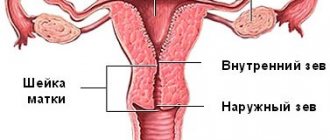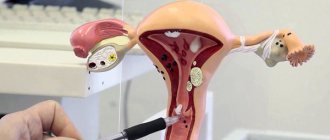A regular menstrual cycle and its painless passage indicate the excellent health of a woman’s reproductive organs. If menstruation comes one or two weeks ahead of schedule, then such symptoms may indicate the appearance of various types of disorders of a woman’s reproductive function and the health of some organs of the reproductive system.
The process of the menstrual cycle must take place cyclically and with a certain periodicity, first the woman’s body prepares for the onset of a possible pregnancy, and when it does not occur, the woman’s uterus is gradually freed from the thickened mucosa, after which the whole process is repeated again and again. Regular periods are one of the indicators for assessing the health of the entire female body.
Moreover, it does not matter what the interval between menstruation is, it is important that the process, the menstrual cycle, be constant, that is, the start and end dates of a woman’s menstruation should not differ much from the previous cycle. It is usually considered normal to delay the onset of menstruation by no more than two days. If a woman’s period begins two weeks ahead of schedule, then this condition is evidence of certain health problems.
The normal interval between menstruation can be from 21 to 45 days, but the frequency of menstruation should be constant. If your periods are inconsistent, that is, your periods are delayed for a certain period of time, then most likely a certain malfunction has occurred in the female body. If we consider the delay of menstruation in young girls and adolescents, then their menstrual cycle can be longer than that of adult women and range from 30 to 45 days. But a delay in menstruation by two to 2 weeks at any age is considered a problem. Even women over 45 years of age should have regular periods and there should be no delay in menstruation, the cycle may be 21 days or more, but such a menstrual cycle at the age of 45 years should be regular.
Introduction
Sometimes hormonal disruptions occur in the female body, which can conceal a great danger. Unfortunately, many representatives of the fairer sex are not very aware that hormonal imbalances can pose health risks. After all, you've probably encountered a situation where your period started a week later or earlier.
The first thing that came to your mind was disruptions in the hormonal system, and soon everything will fall into place. Most often, this is exactly the case, however, sometimes having your period 2 weeks earlier poses a very serious danger. Therefore, do not ignore the state of your health, and if it changes, do not delay going to the doctor.
What Causes Frequent Cycle Disorders?
When it comes to the increasing incidence of menstruation starting two weeks ahead of schedule, we can talk about dysfunction of the ovaries. When the normal functioning of these gonads is disrupted, they begin to produce hormones in a different ratio than is necessary for the formation and maturation of the egg. Most often, doctors make the following 2 diagnoses.
The most common disorder is their anovulatory dysfunction, caused by disruption of the hypothalamic-pituitary system.
In this case, progesterone is not formed at all, and estrogen synthesis is reduced. Increased production of male hormones androgens may begin, which is accompanied by 2 signs - obesity and male-pattern hair growth. Dysfunction is accompanied by infertility, cycle disruption, when menstruation begins earlier and passes in the form of unexpected bleeding. Menopause can also begin prematurely.
Ovarian resistance is a 2nd disruption of the functioning of these glands. The pituitary gland produces the necessary hormones, but the ovaries do not respond to them, menstruation stops completely or begins earlier in the form of irregular bleeding.
The following factors negatively affect the functioning of the female reproductive glands:
- thyroid disease, type 2 diabetes, obesity;
- inflammatory processes in the uterus and its appendages;
- regular overwork, stress;
- tumors in the uterus that cause intermenstrual bleeding;
- miscarriage, abortion;
- incorrect position of the spiral installed earlier;
- starvation, protein and vitamin deficiency;
- insufficient amounts of vitamins A and C in the diet;
- poisoning in hazardous industries;
- intoxication caused by nicotine.
One-time occurrence
Sometimes menstruation occurs 2 weeks earlier only once. This can occur due to a huge number of reasons. Let's consider exactly when such a phenomenon may occur:
- The girls just started getting their periods, so the cycle has not yet improved;
- a problem may arise if a representative of the fairer sex has suffered a brain injury;
- Also, menstruation can start 2 weeks earlier if a woman has been under stress for a long time and is also emotionally unstable;
- sudden weight loss or weight gain can also speed up the onset of menstruation;
- This also sometimes happens when a representative of the fairer sex changes climatic conditions. However, the body will soon adapt to the new living conditions, and the condition will improve;
- Another reason why menstruation is 2 weeks earlier is the presence of inflammatory processes and infections in the body. As soon as the woman begins treatment, the menstrual cycle will return to its previous pattern;
- This condition can also be caused by prolonged exposure to ultraviolet rays, excessive uncontrolled use of medications, as well as abuse of bad habits;
- The most common reason why menstruation came 2 weeks earlier is the discontinuation of oral contraceptives. Do not forget that such drugs provide hormone replacement therapy for our body. After abruptly canceling them, a woman’s hormonal system learns to work again, which is why menstruation can begin earlier than expected.
Cases where violations are recorded once
In the case when a woman experiences a one-time menstrual irregularity, her period may begin in advance due to the following factors:
- adolescence in girls, when menstrual function is just beginning to become established;
- you may get your period earlier due to brain injuries;
- stressful situations or instability of a woman’s nervous system;
- obesity or anorexia due to dieting;
- time zone change;
- use of medications;
- infectious diseases;
- inflammatory processes;
- bad habits of women;
- exposure to ultraviolet radiation;
- sudden refusal to take oral contraceptives.
My period started 2 weeks earlier: reasons
Let's look at an additional list of the most common reasons why menstruation may start earlier:
- Sometimes bleeding may occur after sexual intercourse. This indicates that the woman’s internal organs are damaged. Pay attention to the nature of the bleeding. If it is very abundant, go to the hospital immediately;
- sometimes a small amount of bloody discharge may indicate that a woman is pregnant;
- Please note that if your period comes 2 weeks earlier, this may indicate the presence of dangerous tumors and cancer in the organs of the reproductive system. This phenomenon is not only very dangerous for a woman’s health, but can also lead to death;
- installation of the spiral. Sometimes this method of contraception helps menstruation start 14 days earlier. If such a phenomenon is one-time, then there is no danger in it. However, if it occurs periodically, be sure to tell your gynecologist about it;
- hormonal imbalances. If your period comes 2 weeks earlier, this may indicate that there are disruptions in the woman’s hormonal system. It is very easy to identify them. To do this, you just need to take a blood test to determine the level of hormones in it. After receiving the results, if necessary, the doctor will prescribe you special corrective agents;
- physiological characteristics. Sometimes the onset of premature periods is considered completely normal. These may be the physiological characteristics of the female body. It is especially worth paying attention to this if the woman had relatives in her family who faced exactly the same problem.
Despite the reason that your period comes 2 weeks earlier, in any case, contact your gynecologist and find out exactly the conditions for the appearance of this phenomenon. This way you will be sure whether this condition is considered normal or still requires immediate treatment.
What diseases can occur if menstruation starts 1 week earlier?
Hyperestrogenism
If such a symptom is present, the female body contains a large amount of estrogen. This phenomenon occurs against the background of increasing lack of luteic acid in the body. In such a situation, pregnancy is completely excluded, since there is a high probability of complete absence of ovulation. A similar phenomenon can occur due to the use of medications containing tarragon, tumors in the woman’s genital organs (various types of ovarian cysts), and excessive weight. A simple blood test can detect the disease.
Inflammation
The presence of inflammatory processes in the uterine cavity, ovaries and fallopian tubes can manifest itself in the form of scarlet-colored bloody discharge with clots. This kind of discharge occurs as a result of such a possible disease as uterine fibroids, underdevelopment of the organs of the reproductive system, hypoplasia and glandular hyperplasia.
Bleeding from the uterus
If the onset of menstruation occurs 7 days earlier than usual, then it may well be uterine bleeding, which is very life-threatening. This phenomenon can occur as a result of the development of inflammatory processes, trauma to the uterus, or the development of a tumor on the genital organs.
Important to know: pathology or physiology
We have already said that regular periods are the first and most important indicator that a woman is healthy. It is considered absolutely normal for menstruation to begin a couple of days earlier or later. But a period of two weeks can be attributed to deviations that require clarification of the cause of their occurrence.
Of course, in adolescence, as well as before menopause, it is very difficult to determine exactly when menstruation will begin, since at this age, disruptions may occur in the hormonal system. This condition is physiological. But other reasons are most likely pathological in nature and require medical intervention.
How does menstruation work if your period comes early?
The course of menstruation depends on the reasons why it happened. If the cause is stress, then the woman experiences additional symptoms such as headache, weakness, and insomnia . With hormonal imbalance, the discharge is accompanied by clots and can be abundant.
Infectious diseases appear nagging pain in the lower abdomen and lower back. Implantation bleeding is characterized by short duration and scarcity of discharge.
Short cycle or intermenstrual bleeding
It is important to know! Extra bleeding may occur between periods. They arise due to a sharp increase or decrease in the hormone estrogen during ovulation.
You should not delay going to the doctor, especially if the bleeding is accompanied by general malaise.
This phenomenon is not pathological and occurs in 30% of women. Intermenstrual discharge appears 10-14 days after the end of menstruation and lasts up to 3 days.
Note! Such secretions are very scanty and hardly noticeable.
Read the popular site article: Clotrimazole ointment, suppositories - instructions for use for women
This phenomenon indicates the onset of ovulation. They can also appear against the background of a short cycle. Bleeding does not cause a woman much concern and does not require treatment.
Is it possible to confuse menstruation and implantation bleeding?
It is important to know! Implantation bleeding is different from regular periods. If a woman has an unstable cycle and menstrual flow is scanty, then it can easily be confused with menstruation.
As a rule, implantation bleeding occurs several days earlier and has the following characteristics:
- Scanty discharge.
- Duration ranges from several hours to 2 days.
- The blood is liquid and has a pinkish tint.
A woman should take a pregnancy test if there is reason to do so.
Why does this condition occur regularly?
Some women wonder why their period started 2 weeks early again? If this phenomenon occurs regularly, immediately contact the hospital, because it is very important to find out the reasons why this phenomenon recurs. Most often, failures are a consequence of improper functioning of the ovaries. Many women know firsthand what ovarian dysfunction is. If this is the reason, then it is necessary to consider two main types of this disease:
- the occurrence of instability, which occurs due to the complete absence of the ovulation process. Usually, in this case, the egg does not mature inside the follicle, which means that the possibility that a representative of the fair sex can become pregnant is completely excluded. Please note that in this case you need to start urgent treatment, otherwise you will simply remain childless;
- hormonal disorders. Ovarian dysfunction can also occur due to disruptions in the body's hormonal system. Improper hormone production can also affect the course of your cycle.
Reasons for starting your period early
We have already talked about physiological reasons associated with taking medications, climate change or neuro-emotional tension, now we will look at what diseases can cause the premature onset of menstruation:
- Ovarian dysfunction – occurs when the hormonal balance in a woman’s body is disrupted under the influence of physical activity, endocrine pathologies, diseases of the nervous system, poor nutrition, and poor ecology. Disruption of the ovaries is manifested not only by premature menstruation, but also by changes in its abundance and duration, pain in the lower abdomen, lack of ovulation, and PMS. This disorder can lead to infertility; if you have several of the above symptoms, you should consult a doctor as soon as possible.
- An ovarian cyst is a tumor formation on the ovary that can occur as a result of infection, after an abortion, or in the absence of ovulation. Polycystic ovary syndrome often occurs in girls during puberty, as well as in obesity. Menstruation begins 10 days earlier, hair may begin to grow on the face and chest, and when a large cyst forms, the girl is bothered by pain in the lower abdomen.
- Endometriosis is a common gynecological disease in which endometrial cells grow abnormally and extend beyond the uterine cavity, beginning to put pressure on all neighboring organs. This is manifested by menstrual irregularities, painful menstruation, changes in the color of discharge, pain during sexual intercourse, and pain in the lower abdomen. You can learn more about endometriosis from the video:
- Mycoplasmosis is an infectious disease that is sexually transmitted through unprotected sexual intercourse. In addition to the onset of menstruation a few days earlier, the girl is bothered by itching of the genitals and nagging pain in the pelvic area.
- Tumors of the uterus - in most cases, they form in women over 35 years of age, and are usually benign in nature (most often fibroids are detected). Such tumors often occur after multiple abortions, frequent gynecological inflammatory diseases, and hormonal dysfunctions. A symptom of a uterine tumor is a disruption of the menstrual cycle, the discharge becomes dark, contains blood clots, frequent urge to urinate, pain in the pelvic area, and anemia. These symptoms are a clear sign of an early visit to a gynecologist.
- An inflammatory process in the body – even a common cold can affect a woman’s menstrual cycle. After suffering from acute respiratory viral infection, periods may begin a week earlier, they may be painful, heavy, and longer. A weakened body often cannot cope with the balance of hormone production, which is why such disorders occur.
In addition, improper nutrition, most often a harsh unbalanced diet, can lead to premature menstruation. Perhaps the goal of the diet was achieved, and you managed to lose a few kilograms and fit into your favorite dress, but you should remember that any diet depletes the body’s supply of nutrients, and the lack of fat intake reduces the production of sex hormones. That is why experienced nutritionists recommend getting into a diet gradually and leaving it without sudden changes, so that the body can adapt to changing conditions.
When not to worry
If your period started 2 weeks earlier, this may mean that your body is overloaded emotionally or physically. Of course, different situations happen in life, and we cannot always reinsure ourselves. Let's look at examples of non-dangerous situations why menstruation started 2 weeks earlier:
- your child is very ill. Of course, you begin to worry a lot about this, which means your body is in a state of stress;
- your children are taking entrance exams to college. How can you not worry, because this life moment is very important;
- you have decided to change your job. You are used to the old team, but now everything will have to change. Your body will experience stress in any case;
- you are trying to get pregnant, but you can’t;
- your apartment was robbed, and so on.
As you can see, there are really a lot of situations. All of them can cause persistent emotional stress. Therefore, if your period starts 2 weeks earlier in such cases, then next month your condition should return to normal. If this does not happen, immediately go to see a gynecologist.
Sometimes this phenomenon can occur after an abortion. Your period may start a couple of weeks earlier, and this will not be a cause for concern.
What causes premature menstruation?
The answer to the question of whether menstruation can start a week earlier is yes. Bleeding or spotting 7 days before the expected date does not always indicate illness.
The causes of premature menstruation lie in stress and psycho-emotional stress. Nervous tension and physical fatigue are familiar to almost all women.
Improper functioning of the nervous system causes spasm and dilation of blood vessels. As a result, the activity of the uterus increases, and the endometrium begins to be shed prematurely.
Why else can menstruation start 1 week earlier:
- Age. An unstable cycle is typical for the puberty period, but within 1 to 2 years, periods in teenage girls should become regular. Subsequently, cycle disruptions are observed by the age of 50, which indicates the approach of menopause.
- Taking hormonal medications. Medicines containing hormones disrupt the natural production of female hormones, causing an imbalance.
- Abortion or miscarriage. These situations provoke a hormonal surge, and menstruation begins much earlier or later than usual.
- Use of contraceptives. If a woman is protected from pregnancy using oral contraceptives, her period begins a week earlier due to the body’s adaptation to the new hormonal status. Menstruation begins prematurely even if a woman takes emergency contraceptive pills.
- Changes in climate conditions and time zones. The female body reacts to flights on business trips and vacations in exotic countries with cycle disruptions - menstruation begins either earlier or later. It is impossible to predict how many days the deviation will occur. To prevent flights and travel from spoiling your health, you should travel long distances no more than once a month.
- Pregnancy. After merging with the sperm, the egg enters the uterus after 5–10 days. At the time of implantation, the intrauterine mucous tissue is injured, and scanty bleeding appears. Unaware of her interesting situation, the woman thinks that her period started a week earlier this time. Although in fact, scanty discharge for 1 - 2 days often indicates conception and the introduction of the embryo into the uterine cavity. In an ectopic pregnancy, when the embryo develops in the fallopian tube, false menstruation occurs due to pressure on the blood vessels. As the fetus grows, the bleeding intensifies and severe pain occurs on the side of the abdomen where the egg is implanted.
Heavy periods with clots that started a week earlier indicate a hormonal imbalance. Imbalance in hormone ratio is a common cause of premature menstruation.
Emergency contraception
Most often, emergency contraception is resorted to by representatives of the fairer sex who have had unprotected sexual intercourse with a little-known partner. This method is used to urgently terminate a possible unwanted pregnancy. This method can also be used by married couples who do not want to have a child at the moment. To exclude the moment of conception, you need to wait until your period begins.
The most popular and effective medication intended for emergency contraception is the drug Postinor. It is able to suppress the process of ovulation, therefore it opposes the process of conception. This product contains synthetic hormones that have a negative effect on the female body. Using such a medication is very dangerous, as it can cause irreparable harm to the body, including disrupting the menstrual cycle. If the product is used several times during one cycle, this can cause serious disruptions in the functioning of the hormonal system.
Please note that drugs intended for emergency contraception, although effective, cause irreparable harm to the body. Therefore, consider another method of contraception so as not to be faced with the need to use emergency methods.
Doctors say that after using such hormonal medications, an ectopic pregnancy can occur, and this, in turn, can speed up the process of the onset of menstruation by a couple of weeks.
How to induce menstruation ahead of schedule
A situation may arise in a woman’s life in which it is desirable for her period to come unscheduled. For example, when you have a long trip or a vacation by the sea, and critical days at this time will cause trouble. Of course, regulating your menstrual cycle yourself is a risky step. Doctors do not recommend exposing your health to such danger, but in some cases they can accommodate the patient halfway.
You should not take any measures on your own to provoke menstruation at the right time. Contact your doctor, who is aware of the characteristics of your body and will help you choose the right and safest remedy for you.
What methods can be used to call menstruation:
- The most common way to correct the menstrual cycle is to take oral contraceptives. With their help, menstruation can begin 10 days, 5 days, or a week ahead of schedule. It is necessary to select a drug under the strict supervision of a gynecologist, since most of these drugs have side effects and limitations.
- These same drugs can delay the onset of menstruation. To do this, you need to continue taking the pills, ignoring the usual regimen for taking them. That is, instead of a seven-day break after taking the last twenty-first tablet, you need to start taking a new package. For example, in order for your period to start 10 days earlier, you need to stop taking the drug ten days before the desired date. After one or two days, menstruation will begin. However, try not to resort to this method more than once or twice a year. Disruption of hormonal balance is fraught with various consequences, and restoring balance can require a lot of time and money.
- In case of special need, you can induce menstruation using the emergency contraceptive drug “Postinor” and its analogues. Usually the drug is taken after unprotected sexual intercourse, and a couple of days after taking the pills, menstruation begins.
- People also use some means to get your period 5 days ahead of schedule. However, one should not expect much accuracy since these methods have not been proven to be effective in medical research.
These methods and tips can harm your health, so they should only be used after consulting with your doctor. Do not experiment with drugs or look for folk remedies to induce menstruation - the consequences can be disastrous for your health.
Ovarian cyst
Many representatives of the fairer sex encounter cysts in the ovarian area. Such neoplasms cause their owners a lot of trouble, including causing menstruation 2 weeks earlier. Typically, such cysts occur as a result of the fact that the follicle in which the egg is located is very overripe, and the egg does not have the opportunity to be released after the ovulation process is over. Inside the follicle there are blood vessels that over time begin to burst, and this leads to severe bleeding, which is also accompanied by incredible pain.
So, let's look at how to determine that the follicle has ruptured:
- the fairer sex has very strong pain in the lower abdomen;
- there is a disruption of the menstrual cycle. This can lead to your period coming 2 weeks earlier. The reasons for this are really good;
- in this case, general symptoms may be observed, such as: headaches, nausea, weakness, increased body temperature, and even loss of consciousness;
- the abdominal cavity may also increase in volume, which indicates the occurrence of internal bleeding. This condition is considered very dangerous and can even lead to death.
Menstruation and hormones
Hormones produced by the endocrine glands are responsible for the regularity of the process. All internal organs are controlled by one of the parts of the brain - the hypothalamus. Periodically, it produces the hormone GnRH, which stimulates the work of another department - the pituitary gland. The pituitary gland saturates the blood with the hormone follitropin (FSH), under the influence of which the ovaries produce a follicle with an egg. The maturation of the egg provokes the production of another hormone - estrogen. Under the influence of estrogen, the uterus begins to prepare for pregnancy - to build up loose mucous membranes and blood vessels. During this period, the pituitary gland stops producing FSH and produces another hormone - luteinizing hormone, the most mature of the follicles bursts and the egg is released into the cavity of the fallopian tube. Ovulation is accompanied by the beginning of the production of 2 hormones - progesterone.
If fertilization does not occur within a week, the production of estrogen and progesterone decreases, menstruation begins: the loose inner layer of the uterus is destroyed and, together with menstrual blood, comes out. Various factors can interfere with this process, disrupting its order: menstruation may begin earlier than expected. A deviation of 2 days cannot be a pathology.
Pregnancy
If your period is 2 weeks early, this can sometimes indicate pregnancy. However, even in this case there may be hidden pitfalls. Of course, most often the onset of pregnancy is a reason for joy, since the egg merges with the sperm and this may be accompanied by slight bleeding. However, premature onset of menstruation can also signal an ectopic pregnancy. If you experience bleeding ahead of schedule, be sure to consult a gynecologist to determine its etymology. After all, you can see for yourself that there can be a huge number of reasons. Usually girls think that a delay in menstruation signals the beginning of pregnancy, but as it turns out, everything can be exactly the opposite.
Possible reasons
There are many possible factors that can affect the disruption of the usual menstrual cycle:
- nervous or emotional overload, stress;
- acclimatization (moving to new conditions, going on vacation to an area with a different climate);
- emergency contraception;
- pregnancy, including ectopic;
- lactation period;
- miscarriage;
- abortion;
- hormonal imbalance;
- hereditary factor;
- use of oral contraception;
- injury to the vagina or cervix (internal bleeding);
- uterine bleeding;
- physical stress;
- cold;
- first sexual intercourse;
- inflammatory or infectious disease;
- oncology;
- uterine fibroids;
- overweight;
- sexual infection;
- cardiovascular diseases;
- kidney or liver problems;
- poisoning with harmful substances;
- exceeding the permissible level of radiation;
- installed intrauterine device;
- diet;
- irregular sex life;
- lack of vitamins, microelements and nutrients necessary for the body;
- unhealthy lifestyle (smoking, a lot of alcohol, drugs);
- some medications (cycle disruption is usually indicated as side effects).
Premature onset of menstruation may be normal during the period of establishing a period. This usually occurs during adolescence or after pregnancy, when the cycle is restored again. Similar failures are also typical before menopause.
Causes of early heavy periods
It is necessary to distinguish between the abundance of menstruation. When they begin ahead of schedule, and the bleeding is heavier than usual, then possible reasons for this may be:
- internal bleeding;
- hormonal disorder;
- gynecological disease;
- problems with the gastrointestinal tract;
- great physical activity;
- diet;
- lack of elements necessary for the body;
- abortion;
- ectopic pregnancy;
- disorders in the reproductive system.
If your period starts early and is quite heavy, then there are several signs that should alert you:
- blood is bright scarlet;
- absence of clots;
- deterioration of general condition;
- pain or pain (read more about why your stomach hurts during menstruation here);
- pre-fainting state.
If such alarming factors occur, without exception, you should contact a specialist.
Heavy bleeding, including blood clots, may indicate pseudomenstruation. This phenomenon usually occurs in certain reproductive system disorders, such as endometriosis.
Reasons for scanty discharge ahead of schedule
When menstruation begins prematurely and is quite scanty, there are several explanations for this phenomenon:
- injury causing internal bleeding;
- hormonal imbalance;
- consequences of the inflammatory process;
- previous gynecological surgery (including abortion);
- emotional or nervous overstrain, stress;
- metabolic disease;
- diet, unhealthy diet;
- pregnancy (including ectopic);
- lactation;
- excessive physical activity.
Scanty menstruation is called hypomenorrhea, and a reduction in the number of days of menstruation is called oligomenorrhea. This phenomenon occurs normally only during puberty or before menopause. In other cases, this indicates some kind of violation.
What to do if your period starts early
If you notice that your cycle is out of whack, don't panic right away. Relax and try to understand what could have influenced the occurrence of such a phenomenon. Determine the symptoms that are present specifically for you, and based on this, you can already plan your further actions.
If you have experienced a stressful situation in the near future, for example, you had a fight with someone, changed your job, or something happened to your loved ones, then it is considered normal that your body reacted with a premature onset of menstruation. Every woman's body is individual. For some people, their periods are delayed, for others, on the contrary, they come earlier.
If the early arrival of menstruation is accompanied by other symptoms, such as nausea, abdominal pain, weakness, and other phenomena, then this may signal an ectopic pregnancy, as well as miscarriage or rupture of the follicle. In this case, urgently call an ambulance, as your health may be in serious danger.
Character of menstruation
Some people mistakenly believe that only heavy periods are painful; in fact, scanty periods can cause severe pain. With scanty periods, you may additionally experience headaches, nausea, pain in the lower abdomen and lower back, problems with bowel movements, and these can be expressed as constipation and diarrhea. If you have a scanty period ahead of schedule, it could be caused by the following reasons:
- childbirth. After the birth of the baby and the completion of lochia, the expected menstruation may begin earlier, most often the discharge will have a pale brown tint;
- curettage that accompanies abortions, removal of polyps or other diagnostic and therapeutic interventions;
- ovarian dysfunction;
- heredity;
- inflammatory diseases of the pelvic organs.
Diagnostic measures
If you are constantly worried about irregularities in the menstrual cycle, be sure to consult a gynecologist in order to identify the cause of their occurrence. The doctor will prescribe a list of certain tests for you, as well as undergoing certain procedures in order to accurately determine the state of your reproductive system. So, usually, diagnostic measures are:
- taking a general blood and urine test;
- strokes;
- oncology analysis;
- biopsy and MRI, if necessary;
- ultrasound examination.
Only after a full examination can you determine why your period started ahead of schedule.
Lifestyle-related menstrual cycle disorders
An examination by a gynecologist did not reveal any diseases in the body, which means that the cause of the cycle disruption may be the woman’s lifestyle. Her work, for example, causes overwork or stress; frequent business trips lead to climate change and negatively affect the body.
To bring your menstrual cycle back to normal:
- rest more, take breaks during work;
- be in the fresh air more often, move more actively;
- go to bed at the same time, sleep duration is at least 6-8 hours;
- eat well, properly. Eat more vegetables, fruits, avoid spicy, fatty foods, stop drinking alcohol and smoking;
- take vitamins, drink more fluids, herbal teas;
- start playing sports, doing exercises, swimming;
- If you are stressed, take a course of sedatives and try to avoid conflicts.
- experience more positive emotions, communicate with family and friends.
conclusions
Being a woman is wonderful, but being a healthy woman is much better. Don't forget to monitor your health. A correct menstrual cycle is confirmation that the fair sex is healthy. If your period comes earlier or later than expected, this indicates the presence of problems in the body. Such failures can not only affect your health, but also completely deprive you of the opportunity to get pregnant. Therefore, visit your gynecologist twice a year for prevention, and also every time something bothers you. Very often, ignoring trips to the hospital and self-medicating significantly worsens the situation.
Take care of your health today, don’t let it take its course. Carefully monitor your menstrual cycle, eat right, exercise regularly, learn to avoid stressful situations, and also alternate between work and rest correctly. Don't forget that you only have one health. Take care of it and you will notice how it will begin to take care of you. Be healthy and take care of yourself!
Normal menstrual cycle
The menstrual cycle is a physiological process characterized by a lot of subtleties. Its normal course indicates that the egg is developing, maturing and capable of fertilization.
The menstrual cycle is individual for each woman, but there are some averages that are considered normal. A cycle is the period of time from the first day of menstruation to the first day of the next menstruation. Ideally, it should be 28 days, but a limit of 21 to 35 days is considered the norm.
Menstruation normally lasts 3-7 days, and blood loss during this time is no more than 100 ml.
Basics about periods
The correct name for the main process of the female body is menstruation. It is taken from Latin. And it was not chosen by chance. Translated into Russian it means that your period has begun. Another translation of this word is regula. This is not just spotting, if it starts, then it is a cleansing process and in this way the body removes dead particles of the endometrial layer and the mucous membrane of the uterus. If you carefully examine the discharge, you will notice that the blood contains mucus and pieces of the endometrium. The blood also differs in appearance; it is dark.
A girl's puberty begins when her period begins. The menstrual cycle is counted from the first day of their onset. From a medical point of view, it should last about 28 days. But there are often exceptions, and therefore if it is two shorter or longer, then this does not apply to pathology.
While the body is forming and adjusting to reproductive activity, periods may be inconsistent. The discharge itself is not abundant. In two years everything will go back to normal and the cycle will be regular. The ability to reproduce in women ends around the age of fifty. Until this age, women should monitor the duration of their cycle and pay attention to how their periods came. If they started a week earlier, then perhaps something in the body began to work wrong.
To understand why this happens, you need to understand what the essence of menstruation is and how they pass.








